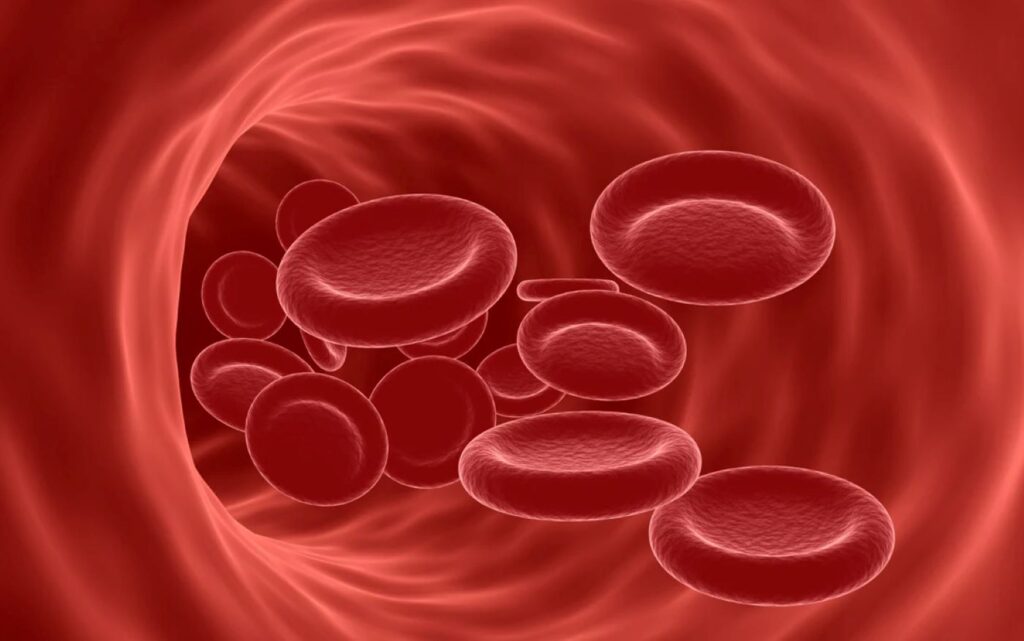Health Conditions
Find out How Iron Deficiency Could be Making You Feel Cold
Iron is essential for the production of hemoglobin, a protein in red blood cells responsible for carrying oxygen to the tissues. When iron levels are low, the body may struggle to generate enough heat, leading to a feeling of coldness.
Are you constantly reaching for an extra sweater or complaining about the chilly room temperature? It could be more than just the weather bringing a chill to your bones. Iron deficiency, a condition characterized by low levels of iron in the body, has been associated with feeling cold.
But, does iron deficiency really make you cold? In this article, we will explore the connection between iron levels and body temperature, as well as the other symptoms of iron deficiency to watch out for. We will also delve into the causes of iron deficiency and provide tips on how to prevent and treat it. Knowledge is power, so stay tuned to discover whether iron deficiency may be the culprit behind your incessant shivering.
Understanding Iron Deficiency
Iron deficiency occurs when the body does not have enough iron to meet its needs. Iron is an essential mineral that is required for a variety of body activities. It is essential for the formation of hemoglobin, which transports oxygen to tissues, as well as for energy production and immunological function. Low iron levels can impair the body’s capacity to perform certain processes efficiently.
Iron deficiency can arise for a variety of causes, including insufficient intake of iron-rich foods, poor iron absorption, increased iron requirements (such as during pregnancy or puberty), or excessive iron loss through bleeding. Understanding the causes of iron shortage is critical for resolving the problem and avoiding future difficulties.
Symptoms of Iron Deficiency
Feeling chilly is just one of the signs of iron deficit. Other symptoms include fatigue, weakness, pale complexion, shortness of breath, dizziness, headaches, brittle nails, and restless leg syndrome.
These symptoms arise because iron is required for the formation of red blood cells, which transport oxygen throughout the body’s organs and tissues. Low iron levels impair the body’s ability to adequately supply oxygen, resulting in these symptoms.
It is crucial to remember that the severity of symptoms varies from person to person and is determined by the level of iron deficit. Some people may experience moderate symptoms, while others may have more severe symptoms that interfere with their everyday life. Recognizing these symptoms is critical for diagnosing iron insufficiency and obtaining suitable treatment.

Causes of Iron Deficiency
Iron deficiency can have numerous origins, and determining the underlying cause is critical to effectively resolving the problem. The most common causes are:
- Inadequate dietary intake: Not consuming enough iron-rich foods, such as red meat, poultry, fish, legumes, and leafy green vegetables, can lead to iron deficit.
- Poor iron absorption: Certain conditions, such as celiac disease, inflammatory bowel disease, and gastric bypass surgery, can impair the body’s ability to absorb iron from food.
- Increased iron requirements: During certain life stages, such as pregnancy, infancy, and adolescence, the body’s iron needs increase, and inadequate intake may result in deficiency.
- Blood loss: Chronic blood loss due to heavy menstrual periods, ulcers, gastrointestinal bleeding, or frequent blood donation can deplete iron stores over time.
Identifying the specific cause of iron deficiency is crucial in determining the appropriate treatment and prevention strategies.
How Iron Deficiency Affects Body Temperature Regulation
Individuals with iron deficiency frequently report feeling cold. Iron is essential for body temperature regulation since it helps to produce heat. When iron levels are low, the body may struggle to generate sufficient heat, resulting in a sense of coldness even in warm circumstances.
The thyroid gland, which regulates body temperature among other activities, requires iron to function properly. Low iron levels can impair thyroid function, causing a slower metabolic rate and decreased heat output.
Iron deficiency can also influence red blood cell synthesis, resulting in diminished oxygen supply to tissues and impaired thermoregulation.
It’s vital to note that simply feeling cold isn’t enough to identify iron deficiency. Additional symptoms and laboratory tests are required to confirm the diagnosis. If you suspect iron deficiency, you should consult a healthcare professional for a complete diagnosis and treatment.

Common Misconceptions About Iron Deficiency and Feeling Cold
There are a few myths about iron deficiency and feeling cold. One of the most widespread myths is that feeling cold is only caused by iron deficiency. While iron deficiency might make you feel cold, it is not the only possible explanation. Other causes that might cause a feeling of coolness include insufficient body fat, poor circulation, and certain medical diseases.
For a correct diagnosis, additional probable causes must be considered, as well as consultation with a healthcare expert. They can perform the necessary tests to discover the underlying cause of cold symptoms and make suitable treatment suggestions.
Other Potential Causes of Feeling Cold
If you frequently feel cold, you should examine other possible explanations besides iron deficiency. Some possible factors are:
- Low body fat: Individuals with low body fat may have less insulation, making them more susceptible to feeling cold.
- Poor circulation: Conditions that affect blood flow, such as Raynaud’s disease or peripheral artery disease, can contribute to feeling cold.
- Underactive thyroid: Hypothyroidism, a condition characterized by an underactive thyroid gland, can lead to feeling cold due to a slower metabolic rate.
- Anemia: While iron deficiency anemia can cause feeling cold, other forms of anemia, such as vitamin B12 or folate deficiency anemia, can also have similar symptoms.
Considering these potential causes and discussing your symptoms with a healthcare professional can help identify the underlying issue and guide appropriate treatment.

Diagnosing and Treating Iron Deficiency
If you suspect iron deficiency, you should speak with a healthcare expert to get an accurate diagnosis. They will usually run blood tests to determine your hemoglobin levels, hematocrit, and serum ferritin, which indicate iron storage in your body. These tests help to diagnose iron deficit and estimate its severity.
Treatment for iron shortage often consists of boosting iron intake by dietary adjustments and/or iron supplementation. A healthcare practitioner will prescribe the best technique based on the individual’s needs and the severity of the iron deficit. In some circumstances, further study may be required to determine the underlying reason and handle it correctly.
To ensure that iron levels return to normal, follow the indicated treatment plan and monitor them on a regular basis. Iron deficit is a treatable ailment, and with proper treatment and lifestyle adjustments, people can reduce their symptoms and improve their general health.
Lifestyle Changes to Help with Iron Deficiency and Feeling Cold
In addition to medical treatment, several lifestyle adjustments can help boost iron levels and reduce feelings of coldness. Consider adding the following habits to your regular routine:
- Eat a balanced diet: Include iron-rich foods in your meals, such as lean meats, poultry, fish, lentils, spinach, and fortified cereals. Pairing iron-rich foods with sources of vitamin C, like citrus fruits or bell peppers, can enhance iron absorption.
- Avoid tea or coffee with meals: These beverages contain compounds that can inhibit iron absorption. It’s best to consume them at least one hour before or after meals.
- Cook in cast-iron cookware: Cooking acidic foods in cast-iron cookware can increase the iron content of the food.
- Consider iron supplementation: If dietary changes alone are insufficient, a healthcare professional may recommend iron supplements to boost iron levels. These should be taken as directed and in conjunction with dietary modifications.
- Manage stress levels: Chronic stress can affect iron absorption and utilization. Incorporate stress management techniques, such as meditation, exercise, or therapy, into your routine to support overall well-being.
Remember to consult with a healthcare professional before making any significant dietary or lifestyle changes, especially if you have underlying health conditions or are taking medications.

When to See a Doctor for Iron Deficiency and Feeling Cold
If you have persistent iron deficiency symptoms, such as feeling cold, fatigued, or short of breath, you should see a doctor. They can examine your symptoms, run the required tests, and make therapy recommendations based on your specific needs.
If you have severe or recurring symptoms that are interfering with your everyday life, you should seek medical assistance right once. Iron deficiency can have long-term implications if not treated, thus early detection and intervention are critical for good health.
Conclusion
Feeling cold may be more than just a personal preference for warmth. Iron deficiency, a disorder marked by low iron levels in the body, has been linked to feeling cold due to its function in body temperature control and oxygen transport. However, simply feeling cold is insufficient to identify iron deficiency; other reasons may contribute to this sensation.
Recognizing the symptoms of iron deficit and understanding the reasons are critical for resolving the problem and avoiding future consequences. If you feel you have iron deficit, you should see a doctor to get a proper diagnosis and therapy.
Individuals can treat iron deficiency and decrease cold symptoms with suitable interventions such as dietary adjustments, supplementation, and lifestyle changes, thereby increasing their overall well-being. Remember, information is power, and taking proactive actions to improve your health is always a sensible decision.
Trusted Health, Wellness, and Medical advice for your well-being



